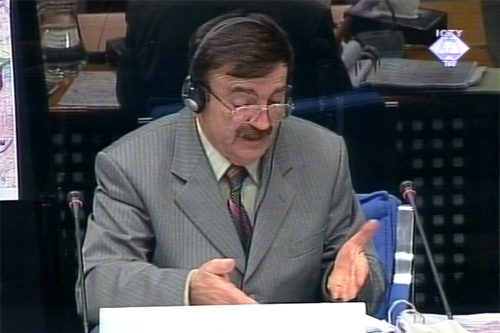Home
GENERAL JELIC: "NOT A CHANCE OF SOMEONE FIRING AT CIVILIANS "
General Krsman Jelic begins his testimony at the trial of Slobodan Milosevic. He is a former commander of the VJ 243rd Mechanized Brigade. The village of Racak was in his area of responsibility in 1999. The witness denies that claims made by Canadian general Maisonneuve, one of the heads of the Kosovo Verification Mission. Testifying for prosecution, General Maisonneuve said that Jelic's liaison officer had told him on 16 January 1999 that the army had given "fire support" to the police during the action in Racak
 Krsman Jelic, defense witness for Milosevic
Krsman Jelic, defense witness for Milosevic Since the "workbook" of Lit-Col Janos Sel has not yet arrived in The Hague, his cross-examination will be postponed until next week. Milosevic then called his new witness, retired general Krsman Jelic.
At the time relevant for the Kosovo indictment, Colonel Jelic was the commander of the VJ 243rd Mechanized Brigade. The municipalities of Urosevac, Strpce, Stimlje and Kacanik were in his area of responsibility. So was the village of Racak. On 15 January 1999, the first crime in Kosovo Milosevic is charged with was committed there. According to the indictment, not only the police, but the military participated in the attack in which more than 40 civilians were killed. General Jelic denied today any involvement of the military in the "anti-terrorist action", although he did confirm that a combat group had been deployed on Canovica hill – a position about a kilometer away from Racak as the crow flies. The combat group had tanks, praga guns and armored personnel carriers. The general claims that the combat group did not open fire in the direction of Racak on 15 January, but in the direction of Belince, because fire had been opened on it from mortars and anti-aircraft guns. The military opened fire only on "terrorist firing positions", not on the village itself, because, as he put it, "not a chance that someone was firing at civilians".
Colonel Jelic was mentioned in the prosecution case by Canadian general Maisonneuve, former head of the Kosovo Verification Mission regional centre in Prizren.
The day after the Racak incident, General Maisonneuve went to the command of the VJ 243rd Brigade in Urosevac, asking to meet with Colonel Jelic. He was received by Jelic's liaison officer, Lt-Col Petrovic. According to Maisonneuve's records, Petrovic said that Racak "had been done by the MUP /Interior Ministry/" with the army providing fire support from a tank and an anti-aircraft gun. When the Canadian general finally managed to meet with the commander of the 243rd Brigade after several failed attempts, Colonel Jelic – Maisonneuve claimed – evaded giving a direct answer, claiming that the army did not fire on Racak but on two nearby villages, and that the VJ and MUP did not coordinate their actions, but acted "separately but simultaneously". The Canadian general rejected this claim as "illogical".
After Milosevic told him about those claims today, General Jelic denied having tried to avoid to meet with Maisonneuve and having tried to evade answering his questions once they did meet. According to Jelic, Maisonneuve wanted him to "confirm that the VJ participated in the action in Racak". He told him he couldn't confirm the thing that did not happen.
As for what Maisonneuve noted down about the statements made by Lt-Col Petrovic – that the army provided fire support to the MUP in Racak – Jelic labeled the claim a "nonsense" because the police "was already in the village". The judges wanted to know what Petrovic had told his superior officer about the conversation with the Canadian general. After Milosevic persistently refused to ask the question, they asked assigned counsel Kay to take over that portion of the examination.
Petrovic, the witness replied, told him Maisonneuve had asked him what the VJ had been doing in Racak and whether it had entered the village. He also claimed that the army's presence in the area was illegal and insisted to be told the names of the commanders of all units that had participated in the operation because he wanted to give their names to the war crimes tribunal. According to the witness, Petrovic replied that the army's presence in the area was legal, that it had not entered Racak and that he couldn't tell him who had been in command of the action because did not know who had been there.
After that, Milosevic tried to draw the judges attention to the fact that the Canadian general was referring to war crimes as early as in the morning of 16 January, while the then head of the OSCE monitoring mission, Ambassador Walker did not come to Racak until the next day, “when he discovered the alleged massacre".
Milosevic obviously forgot that Maisonneuve testified that he had been in Racak in the morning of 16 January and that he had found the bodies of about twenty men in a pit near the village. He described them as a "set of elderly gentlemen". He concluded they had been shot at point blank range, mostly to the head. That is why he went to Urosevac to seek commander Jelic, as the incident had happened in his area of responsibility.
Linked Reports
- Case : Milosevic Slobodan - "Kosovo, Croatia and Bosnia"
- 2005-11-30 LIEUTENANT COLONEL SEL'S WORKBOOK
- 2005-11-29 MILOSEVIC AND NICE OPPOSE SEVERANCE
- 2005-11-22 JUDGES WANT TO CONCLUDE MILOSEVIC TRIAL ON KOSOVO INDICTMENT
- 2005-12-06 CHAIN OF COMMAND AND CHAIN OF CARE
- 2005-12-07 GENERAL JELIC CHALLENGES GENERAL STAFF
- 2005-12-08 MILOSEVIC ASKS 380 HOURS MORE FOR HIS EVIDENCE
